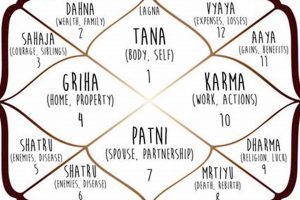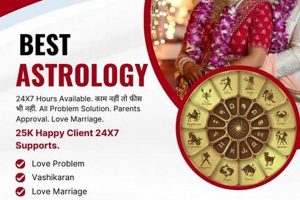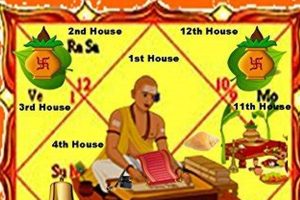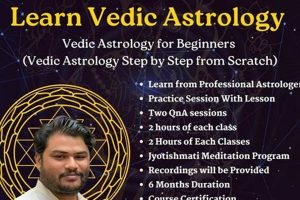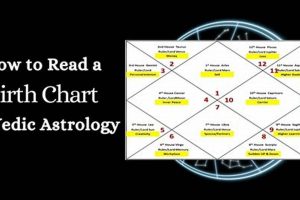A facility dedicated to the practice and study of Vedic astrology, also known as Jyotish, typically offers consultations, educational resources, and remedial measures based on this ancient Indian system. These establishments may provide services such as natal chart readings, predictive astrology, gemstone recommendations, and guidance on auspicious timings for important life events. A hypothetical example would be a location offering personalized birth chart interpretations to clients seeking self-awareness and guidance.
Such institutions play a vital role in preserving and disseminating the knowledge of Jyotish. They offer a space for individuals to explore this traditional system for understanding life’s patterns and potentials. Rooted in ancient Vedic scriptures, this practice emphasizes the interconnectedness of celestial movements and human experience, offering insights into one’s karma, dharma, and life purpose. Historically, these centers served as hubs of learning, contributing significantly to the development and transmission of astrological wisdom across generations.
This exploration of the core concept serves as a foundation for a deeper dive into specific aspects of Jyotish, including its philosophical underpinnings, practical applications, and relevance in contemporary society. Further discussion will delve into the various services offered, the qualifications of practitioners, and the potential benefits for individuals seeking guidance and self-discovery.
Tips for Engaging with Jyotish
These guidelines offer practical advice for navigating the realm of Vedic astrology and maximizing the potential benefits of its insights.
Tip 1: Approach with an Open Mind: Cultivating a receptive mindset allows for a deeper understanding of the multifaceted nature of Jyotish. Recognizing its potential to offer valuable perspectives, while acknowledging its limitations, facilitates a balanced approach.
Tip 2: Seek Qualified Practitioners: Consulting experienced and reputable practitioners is essential for receiving accurate and insightful interpretations. Thorough research and recommendations can help individuals identify knowledgeable professionals.
Tip 3: Understand the Birth Chart as a Roadmap: The birth chart serves as a personalized cosmic blueprint, offering insights into individual strengths, weaknesses, and karmic predispositions. Studying this map allows for a deeper understanding of one’s life path.
Tip 4: Focus on Self-Improvement: Jyotish should be viewed as a tool for self-development and empowerment. Rather than solely relying on predictions, individuals should focus on utilizing astrological insights to make informed decisions and cultivate positive change.
Tip 5: Integrate with Other Disciplines: Jyotish can complement other forms of self-exploration, such as psychology, spirituality, and mindfulness practices. Integrating these approaches can provide a more holistic understanding of oneself.
Tip 6: Avoid Fatalistic Interpretations: While planetary influences are significant, free will and personal actions play a crucial role in shaping one’s destiny. Avoid interpreting astrological insights as fixed predictions and instead focus on utilizing them as guidance for making conscious choices.
Tip 7: Be Patient and Persistent: Understanding the complexities of Jyotish takes time and dedication. Consistent study and reflection can yield deeper insights and a greater appreciation for its wisdom.
By following these suggestions, individuals can cultivate a more meaningful and beneficial engagement with the practice, fostering self-awareness and informed decision-making.
These practical tips offer a starting point for navigating the intricacies of Jyotish. The following conclusion will summarize key takeaways and offer further resources for continued exploration.
1. Consultations
Consultations form the cornerstone of any Vedic astrology center. They represent the practical application of Jyotish principles, bridging the gap between abstract astrological concepts and individual life experiences. A consultation typically involves a detailed analysis of an individual’s birth chart, planetary transits, and other astrological factors to provide personalized insights and guidance. This interaction between the astrologer and the individual seeking guidance is crucial for understanding the nuances of the chart and applying its wisdom to real-life situations. For example, a consultation might explore career prospects based on planetary placements or offer advice on relationship compatibility using astrological principles. The effectiveness of these consultations hinges on the expertise of the astrologer and the individual’s willingness to engage openly with the insights provided.
The importance of consultations within a Vedic astrology center extends beyond individual guidance. They serve as a vital link between the ancient tradition of Jyotish and contemporary life, demonstrating the practical relevance of this system in navigating modern challenges. Consultations provide a platform for addressing specific questions, exploring potential solutions based on astrological insights, and fostering a deeper understanding of one’s karmic patterns and life purpose. For instance, a person experiencing difficulties in their career might consult an astrologer to gain clarity on potential obstacles and identify favorable periods for new endeavors. This application of astrological knowledge to practical concerns underscores the valuable role consultations play within a Vedic astrology center.
In essence, consultations act as the primary interface through which individuals engage with the wisdom of Vedic astrology within a dedicated center. They represent a dynamic exchange of information, facilitating both self-discovery and informed decision-making. The quality and depth of these interactions directly impact the effectiveness and value of the center as a whole. Moving forward, it’s essential to explore not only the theoretical framework of Jyotish but also the practical skills and ethical considerations that underpin effective astrological consultations. This understanding fosters a more informed and responsible approach to utilizing the insights provided by Vedic astrology.
2. Remedial Measures
Remedial measures constitute a significant aspect of Vedic astrology centers, offering practical solutions based on astrological diagnoses. These measures aim to mitigate perceived negative influences or enhance positive planetary energies. The connection between remedial measures and Vedic astrology centers is rooted in the belief that specific actions can modify karmic patterns and influence life outcomes. For example, if a birth chart indicates potential financial challenges, an astrologer might recommend wearing a particular gemstone or performing specific rituals to mitigate these difficulties. The rationale behind these measures lies in the principle of harmonizing planetary energies and aligning individual actions with cosmic rhythms.
The importance of remedial measures within Vedic astrology centers stems from their potential to empower individuals to navigate life’s challenges proactively. By offering personalized solutions based on astrological analysis, these centers facilitate a sense of agency and control over one’s destiny. For instance, a person seeking career advancement might be advised to engage in specific mantras or charitable acts to enhance their professional prospects. This practical application of astrological insights distinguishes Vedic astrology centers from purely predictive approaches, emphasizing the potential for positive change through conscious action. The efficacy of these measures remains a subject of debate, but their significance within the practice of Vedic astrology is undeniable.
In summary, remedial measures represent a vital bridge between astrological analysis and practical action within Vedic astrology centers. They offer individuals tangible strategies for addressing challenges and optimizing opportunities based on their unique astrological blueprints. While empirical evidence for their effectiveness may be limited, their cultural and spiritual significance within the tradition of Jyotish underscores their continued relevance. The ethical considerations surrounding the prescription and implementation of these measures warrant careful attention, ensuring responsible and informed practices within Vedic astrology centers. This nuanced understanding of remedial measures is essential for navigating the complex landscape of Vedic astrology and appreciating its multifaceted approach to human well-being.
3. Educational Resources
Educational resources are integral to Vedic astrology centers, serving to disseminate knowledge and foster a deeper understanding of Jyotish. These resources provide a structured framework for learning, enabling individuals to explore the complexities of this ancient system. From introductory materials for beginners to advanced texts for seasoned practitioners, educational resources play a critical role in preserving and transmitting the wisdom of Vedic astrology.
- Introductory Courses
Introductory courses provide foundational knowledge of astrological principles, including planetary influences, zodiac signs, and house systems. These courses often cover basic chart interpretation and predictive techniques. For example, a beginner’s course might explain the significance of planetary aspects or introduce the concept of dashas. This foundational knowledge equips individuals to understand their birth charts and begin exploring the potential of Jyotish.
- Advanced Studies
Advanced studies delve deeper into specialized areas of Jyotish, such as predictive astrology, remedial measures, and electional astrology (Muhurta). These programs cater to individuals seeking to refine their astrological skills and deepen their understanding of specific techniques. For instance, an advanced course might explore the intricacies of Vargas (divisional charts) or focus on the application of Jyotish in financial astrology. These advanced studies provide a platform for continued learning and professional development within the field.
- Workshops and Seminars
Workshops and seminars offer focused learning experiences on specific topics within Vedic astrology. These events often feature guest speakers, interactive discussions, and practical exercises, providing opportunities for deeper engagement with the material. A workshop might focus on a particular astrological technique, such as prashna (horary astrology), or explore the application of Jyotish in relationship counseling. These focused learning experiences enhance understanding and provide practical skills applicable to real-life situations.
- Library and Research Materials
A well-equipped library containing classic texts, contemporary research, and astrological software provides valuable resources for in-depth study and research. Access to these materials allows individuals to explore different perspectives within Jyotish, delve into historical contexts, and stay abreast of current developments in the field. For example, a library might house ancient scriptures like the Brihat Parashara Hora Shastra or offer access to modern astrological software for chart analysis. These resources are essential for serious students and practitioners seeking to expand their knowledge and refine their understanding of Vedic astrology.
The availability of these diverse educational resources within a Vedic astrology center transforms it into a hub for learning and growth within the field of Jyotish. By offering a structured pathway for both beginners and advanced practitioners, these resources ensure the continued transmission and evolution of this ancient wisdom. The integration of educational resources reinforces the center’s role as a vital resource for individuals seeking to understand and apply the principles of Vedic astrology in their lives. Furthermore, these resources contribute to the broader preservation and development of Jyotish as a valuable system of knowledge.
4. Jyotish Experts
Jyotish experts are integral to the functioning of a Vedic astrology center, providing the essential expertise that guides individuals seeking astrological insights. Their presence elevates the center from a mere resource library to a dynamic hub of knowledge and practical application. The connection between Jyotish experts and Vedic astrology centers hinges on their ability to translate complex astrological principles into personalized guidance and actionable advice.
- Chart Interpretation
Jyotish experts possess the knowledge and experience to interpret birth charts accurately, providing individuals with insights into their personality, strengths, weaknesses, and karmic predispositions. For example, an expert can analyze planetary placements and aspects to understand an individual’s career potential or relationship dynamics. This personalized interpretation provides a foundation for self-awareness and informed decision-making.
- Predictive Techniques
Expertise in predictive techniques, such as transits and dashas, allows Jyotish experts to offer insights into future trends and potential challenges. By analyzing planetary movements, they can identify favorable periods for specific endeavors or caution against potential obstacles. For instance, an expert might advise on auspicious timing for a marriage or warn about potential health concerns based on planetary transits. This predictive capacity empowers individuals to navigate life’s uncertainties with greater awareness and preparedness.
- Remedial Measures
Jyotish experts are knowledgeable in recommending and administering remedial measures to mitigate negative planetary influences or enhance positive ones. These measures may include gemstone recommendations, mantra chanting, or specific rituals. For example, an expert might suggest wearing a particular gemstone to strengthen a weakened planet or prescribe specific mantras to alleviate health issues. The ethical application of these remedies is a crucial aspect of their expertise.
- Guidance and Counseling
Beyond technical expertise, Jyotish experts often provide guidance and counseling, helping individuals integrate astrological insights into their lives. They offer support in navigating challenging periods, making important decisions, and understanding karmic patterns. For instance, an expert might provide guidance on career choices, relationship issues, or spiritual development, integrating astrological insights with practical advice. This holistic approach fosters self-awareness, personal growth, and informed life choices.
The presence of qualified Jyotish experts within a Vedic astrology center ensures the accurate interpretation of astrological principles and their effective application in addressing individual needs. Their expertise forms the core of the center’s ability to provide valuable guidance, empowering individuals to navigate life’s complexities with greater awareness and understanding. The quality and ethical conduct of these experts directly impact the credibility and effectiveness of the center as a whole, underscoring their essential role in facilitating meaningful engagement with Jyotish.
5. Chart Analysis
Chart analysis forms the cornerstone of any Vedic astrology center, serving as the primary tool for understanding individual karmic predispositions and life patterns. It provides a framework for interpreting the complex interplay of planetary influences and their impact on an individual’s life. Within the context of a Vedic astrology center, chart analysis acts as the foundational basis upon which personalized guidance and remedial measures are formulated.
- Birth Chart Interpretation
Birth chart interpretation, also known as natal chart analysis, is the foundational element of chart analysis. It involves a detailed examination of the planetary positions at the time of an individual’s birth. This analysis provides insights into personality traits, strengths, weaknesses, and potential life paths. For example, the position of the Sun can reveal core personality traits, while the placement of Jupiter can indicate areas of potential prosperity. Within a Vedic astrology center, birth chart interpretation serves as the initial step in understanding an individual’s karmic blueprint and offering personalized guidance.
- Predictive Techniques
Predictive techniques, such as the analysis of planetary transits and dashas (planetary periods), allow astrologers to forecast future trends and potential challenges. By studying the movement of planets through the zodiac and their interaction with the birth chart, predictions can be made about specific life events and periods of potential growth or difficulty. For instance, the transit of Saturn over the Moon can indicate a period of emotional challenges, while the dasha of Jupiter might signify a time of prosperity and expansion. In a Vedic astrology center, these predictive techniques are utilized to provide clients with foresight and empower them to navigate life’s uncertainties with greater awareness.
- Relationship Compatibility
Chart analysis plays a crucial role in assessing relationship compatibility within Vedic astrology. By comparing the birth charts of two individuals, astrologers can identify potential areas of harmony or conflict. This analysis, known as synastry, considers factors such as planetary aspects and house overlays to determine the potential for a successful and fulfilling relationship. For example, harmonious aspects between Venus in one chart and Mars in another can indicate strong romantic attraction, while challenging aspects between Saturn and the Moon might suggest emotional difficulties. Vedic astrology centers often offer relationship compatibility analysis as a service, providing insights to couples seeking guidance in navigating their partnerships.
- Remedial Measures
Chart analysis not only reveals potential challenges but also informs the prescription of remedial measures. By identifying specific planetary weaknesses or imbalances, astrologers can recommend appropriate remedies to mitigate negative influences or enhance positive ones. These remedies might include gemstone recommendations, mantra chanting, or specific rituals tailored to address the individual’s unique astrological needs. For instance, if a chart indicates a weakened Mars, an astrologer might recommend wearing red coral to strengthen its energy. Within a Vedic astrology center, chart analysis is essential for determining the most effective and personalized remedial measures.
These interconnected facets of chart analysis demonstrate its central role within a Vedic astrology center. By providing a comprehensive understanding of individual karmic patterns and life potentials, chart analysis empowers individuals to make informed decisions, navigate challenges effectively, and cultivate a deeper understanding of themselves and their place in the cosmos. The accuracy and depth of chart analysis directly influence the quality and effectiveness of the guidance provided within a Vedic astrology center, highlighting its importance as a core element of Jyotish practice.
6. Predictive Techniques
Predictive techniques constitute a core component of services offered within a Vedic astrology center. These techniques, rooted in astronomical calculations and astrological principles, aim to provide insights into future trends and potential life events. Understanding these techniques is crucial for appreciating the scope and application of Vedic astrology within a dedicated center.
- Transits
Transits refer to the continuous movement of planets through the zodiac. Analyzing these movements in relation to an individual’s birth chart provides insights into potential opportunities and challenges. For example, the transit of Jupiter through a beneficial house may indicate a period of growth and prosperity, while the transit of Saturn through a challenging house could signify obstacles and limitations. Vedic astrology centers utilize transit analysis to offer guidance on navigating specific periods and making informed decisions based on anticipated planetary influences.
- Dashas
Dashas are planetary periods, each ruled by a specific planet and signifying distinct phases in an individual’s life. These periods vary in duration and influence, shaping the overall trajectory of experiences. For instance, a Jupiter dasha often signifies a time of expansion and good fortune, while a Rahu dasha might bring unexpected changes and challenges. Vedic astrology centers utilize dasha analysis to understand the unfolding of karmic patterns and provide guidance on navigating the various life phases.
- Annual Chart (Varshaphala)
The annual chart, also known as Varshaphala, is a predictive tool based on the solar return. It provides a snapshot of the year ahead, highlighting potential themes and areas of focus. For example, the placement of planets in the annual chart can indicate potential career advancements, relationship developments, or health concerns during a specific year. Vedic astrology centers utilize annual chart analysis to offer yearly forecasts and guide individuals in planning and preparing for the year ahead.
- Horary Astrology (Prashna)
Horary astrology, or Prashna, addresses specific questions by analyzing the astrological chart cast at the moment the question is posed. This technique provides insights into the potential outcome of a particular situation or decision. For example, a person considering a business venture might consult a Vedic astrologer using Prashna to gain insights into the potential success of the venture. Vedic astrology centers offering Prashna provide a valuable resource for addressing immediate concerns and making informed decisions in real-time.
These predictive techniques, when applied within the structured environment of a Vedic astrology center, offer valuable insights into potential life trajectories. By combining these techniques with birth chart analysis and other astrological tools, Vedic astrology centers provide a comprehensive approach to understanding individual destinies and empowering individuals to navigate life’s complexities with greater awareness and foresight. The ethical application of these predictive techniques, emphasizing free will and personal responsibility, remains a crucial consideration for practitioners within these centers.
7. Spiritual Guidance
Spiritual guidance forms a significant dimension within a Vedic astrology center, extending beyond predictive techniques and remedial measures to address the deeper existential questions of life purpose and karmic evolution. The connection between spiritual guidance and a Vedic astrology center lies in the philosophical underpinnings of Jyotish, which views life experiences as reflections of karmic patterns and opportunities for spiritual growth. This perspective distinguishes Vedic astrology from mere fortune-telling, emphasizing self-awareness, conscious action, and the pursuit of dharma (life purpose) as integral components of a meaningful life. For example, a Vedic astrologer, within the context of a center, might guide an individual experiencing career difficulties towards recognizing the karmic lessons embedded within the situation and identifying a career path aligned with their true calling. This guidance transcends practical career advice, addressing the individual’s spiritual evolution and overall life purpose.
This integration of spiritual guidance within a Vedic astrology center enhances its relevance for individuals seeking not just predictions, but a deeper understanding of their life’s journey. By incorporating principles of dharma, karma, and reincarnation, the center offers a framework for interpreting life experiences as opportunities for growth and transformation. For instance, a person facing relationship challenges might be guided towards understanding the karmic dynamics at play and developing greater compassion and empathy, fostering spiritual growth alongside relationship healing. This broader perspective aligns the practice of Vedic astrology with a deeper exploration of consciousness and personal evolution, enriching the services offered by the center.
In essence, the inclusion of spiritual guidance elevates a Vedic astrology center from a purely predictive service to a space that fosters self-discovery and spiritual exploration. By addressing the deeper existential questions that arise from the analysis of birth charts and predictive techniques, the center facilitates a more holistic understanding of life’s purpose and potential. This integrated approach acknowledges the interconnectedness of the material and spiritual dimensions of human existence, providing a framework for utilizing astrological insights for personal growth and transformation. Challenges may arise in balancing the predictive and spiritual aspects of Jyotish, requiring practitioners within these centers to maintain ethical and sensitive approaches to guiding individuals on their spiritual paths. Ultimately, the integration of spiritual guidance enhances the depth and transformative potential of the services offered within a Vedic astrology center, aligning its purpose with the broader pursuit of self-realization and a more meaningful life.
Frequently Asked Questions about Vedic Astrology
This FAQ section addresses common inquiries regarding Vedic astrology, aiming to provide clear and concise information.
Question 1: How does Vedic astrology differ from Western astrology?
Vedic astrology utilizes a sidereal zodiac based on the fixed constellations, while Western astrology employs a tropical zodiac based on the equinoxes. This fundamental difference leads to variations in planetary placements and interpretations between the two systems. Vedic astrology also emphasizes the concept of dashas (planetary periods), which are not typically considered in Western astrology.
Question 2: What is a birth chart and why is it important?
A birth chart, also known as a natal chart or horoscope, is a map of the planetary positions at the precise moment of birth. It serves as a blueprint of individual karmic predispositions, personality traits, and potential life paths. Analyzing the birth chart is fundamental to understanding one’s strengths, weaknesses, and karmic lessons.
Question 3: Are astrological predictions deterministic?
Vedic astrology acknowledges free will and personal responsibility. While planetary influences are significant, individuals possess the agency to shape their destinies through conscious choices and actions. Astrological insights serve as guidance rather than fixed predictions, empowering individuals to navigate life’s challenges and capitalize on opportunities.
Question 4: What are remedial measures in Vedic astrology?
Remedial measures are prescribed to mitigate perceived negative planetary influences or enhance positive ones. These measures may include gemstone recommendations, mantra chanting, specific rituals, or charitable acts. The goal of these measures is to harmonize planetary energies and align individual actions with cosmic rhythms.
Question 5: How can one find a qualified Vedic astrologer?
Finding a qualified Vedic astrologer requires careful consideration. Seek practitioners with demonstrable experience, knowledge, and ethical conduct. Recommendations, testimonials, and professional affiliations can assist in identifying reputable astrologers. It is also essential to ensure alignment with the astrologer’s philosophical approach and communication style.
Question 6: What is the significance of the houses in a birth chart?
The twelve houses in a birth chart represent different spheres of life, such as career, relationships, finances, and health. The placement of planets within these houses signifies their influence on specific areas of life. Analyzing the houses provides insights into potential challenges and opportunities within each domain.
Understanding these fundamental concepts can facilitate a more informed and meaningful engagement with Vedic astrology. Further research and exploration can deepen understanding and appreciation of this complex and ancient system.
The subsequent sections will explore specific applications of Vedic astrology, offering practical insights into its relevance in various life domains.
Conclusion
Exploration of establishments dedicated to Vedic astrology reveals their multifaceted nature. These centers serve as repositories of astrological knowledge, offering services ranging from natal chart interpretations and predictive techniques to remedial measures and spiritual guidance. The significance of qualified practitioners within these centers is underscored, emphasizing the importance of expertise in navigating the complexities of Jyotish. Analysis of birth charts, predictive techniques, and remedial measures provides a framework for understanding individual karmic patterns and navigating life’s challenges. The integration of spiritual guidance within these centers elevates their purpose beyond mere prediction, fostering self-awareness and a deeper understanding of life’s purpose.
The enduring relevance of Vedic astrology centers lies in their potential to empower individuals through self-knowledge and informed decision-making. Further exploration of Jyotish and its practical applications within these centers offers a pathway to deeper understanding and a more meaningful engagement with this ancient system of knowledge. Continued research and responsible practice contribute to the preservation and evolution of Vedic astrology as a valuable tool for self-discovery and navigating the complexities of human experience.


